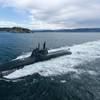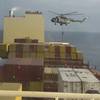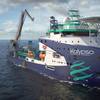USCG Safety Alert: Recreational Diving from Commercial Platforms ...
United States Coast Guard Assistant Commandant for Prevention Policy Marine Safety Advisory 01-12 June 21, 2012 Washington, DC; Recommendations for Recreational Diving Operations Occurring from Commercial Passenger Vessels.
This advisory is addressed to Passenger Vessel Operators, Owners and Crewmembers providing commercial transport and support services to recreational divers, and reminds them of safety responsibilities to themselves and their passengers. Additionally, this advisory is intended to provide recommendations and lessons learned from recreational diving casualty investigations, and promote awareness of industry best practices.
While recreational diving is not regulated by the Coast Guard, the USCG licensed Master of a commercial vessel transporting Divers / Passengers is ultimately responsible and accountable for vessel and passenger safety. Administrative action can be taken against an operator if his or her unsafe actions or decisions lead to an injury or fatality.
Due to an increase in the number of fatalities associated with passenger vessels supporting recreational diving activities, the Coast Guard believes there is a need for improved safety and performance in this area. Accordingly, the Coast Guard strongly recommends that passenger vessel operators performing dive site transit services and recreational diving operations develop and use daily operational and maintenance procedures that cover recreational dive evolutions which may include:
- Loading and stowing dive gear;
- Loading passengers;
- Transiting to dive site;
- Dive pre-brief and dive planning;
- Knowing dive site specific risks and hazards;
- Pre-dive equipment checks;
- Entering water;
- Boarding vessel;
- Accounting for all divers;
- Departing dive site;
- Returning to port;
- Unloading passengers;Unloading gear;
- Duties and responsibilities of crew members; and
- Accounting for the safe return of all divers and passengers.
Fueling, emergency, man-overboard, firefighting, evacuation and diver rescue / recovery procedures should be included. Each member of the organization should have access to the written procedures and be trained on them. Owners and operators of a vessel providing dive equipment to passengers should maintain equipment as required by the equipment manufacturer and keep this information together with a record of periodic inspections and tests performed.
If the vessel provides a diving guide or dive master, or if one is provided by the excursion party, it is recommended that a planning and coordination meeting be held between all involved to ensure the highest level of safety. Additionally, procedures are recommended to address the operator’s approved range of operations taking into account the operational limitations of the vessel, the environmental conditions reasonably expected, the number and experience range of diving passengers, and the duration of a typical excursion.
It is important to note that while the passenger safety orientation requirements in 46 CFR 185.506 and 46 CFR 26.03-1 do not specifically include recreational diving topics, it is considered a best practice to do so. Additionally, it is recommended that the vessel operators account for the following prior to permitting the divers to enter the water, regardless of the experience level of those involved:
- Diver responsibilities;
- Vessel and crewmember responsibilities;
- Estimated time on site;
- Dive site orientation and hazzards;
- Communication procedures between submerged divers and vessel;
- Emergency procedures for distressed or disabled divers;
- General safety considerations unique to the vessel; and
- Environmental conditions to be expected.
Passenger vessels providing commercial transport and support services to recreational divers may use special equipment to ensure the safety of passengers such as rescue points for distressed divers. These components should be properly maintained, sufficiently sized and strengthened to support all personnel involved in the retrieval of a distressed or incapacitated diver. Enhanced medical / first aid equipment, such as medical oxygen for injured divers may be carried onboard. This equipment should be inspected regularly to ensure it is adequate for service. A logbook of inspection, maintenance, service, and repair should be kept for reference.
The Coast Guard encourages Owners / Operators, industry experts and associations to work together to develop and share best practices for passenger vessels providing commercial transport and support services to recreational divers in order to minimize injuries and the potential for fatalities.
This advisory is provided for informational purposes only and does not relieve any domestic or international requirement. This document was produced in collaboration with the Office of Operating and Environmental Standards, Office of Commercial Vessel Compliance and the Office of Investigations and Analysis, U.S. Coast Guard Headquarters, Washington, DC.













